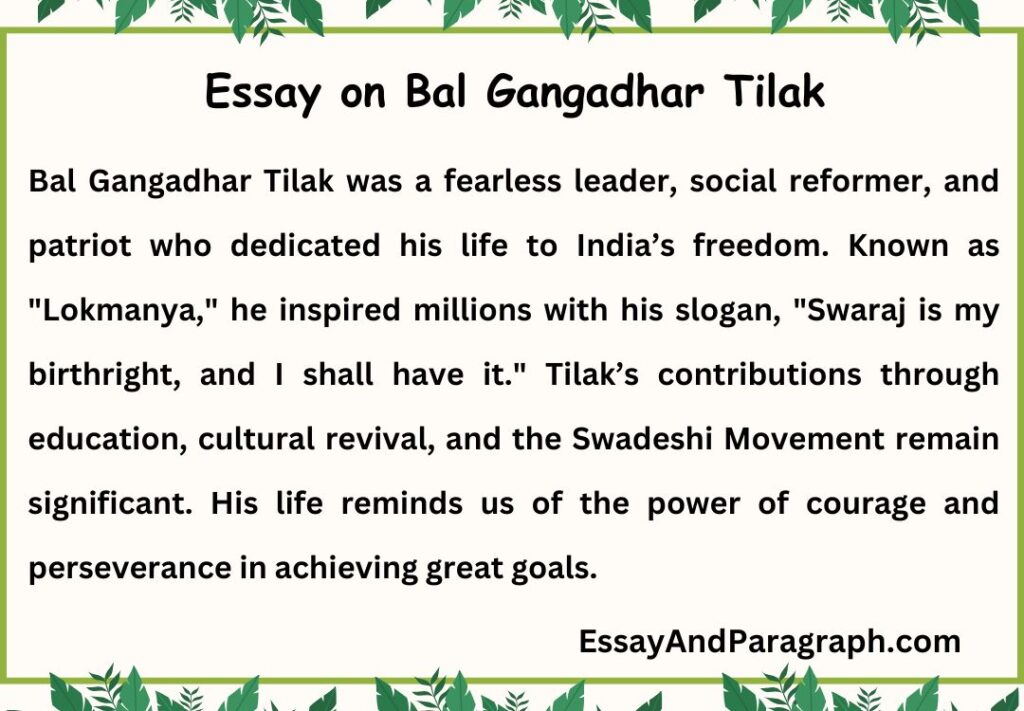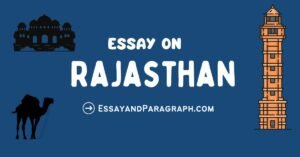Have you ever wondered who first declared, “Swaraj is my birthright, and I shall have it”? Bal Gangadhar Tilak, known as the Father of Indian Unrest, was a fearless freedom fighter who inspired millions to fight for India’s independence. His dedication to education, self-rule, and cultural revival made him a key figure in the Indian freedom movement.
In this article, we will explore how to write an essay on Bal Gangadhar Tilak, focusing on his life, achievements, and impact.
10 Lines Essay on Bal Gangadhar Tilak for Students
- Bal Gangadhar Tilak was a great leader and freedom fighter of India.
- He was born on July 23, 1856, in Ratnagiri, Maharashtra.
- Tilak was called “Lokmanya,” which means “respected by the people.”
- He famously said, “Swaraj is my birthright, and I shall have it.”
- Tilak started newspapers like Kesari and The Mahratta to inspire people.
- He believed in reviving Indian culture and traditions.
- Tilak organized Ganesh Utsav and Shivaji Jayanti to unite people.
- He wrote books like Gita Rahasya to spread knowledge.
- Tilak played an important role in the Swadeshi Movement.
- He is remembered as a brave leader who dedicated his life to India’s freedom.

Short Essay on Bal Gangadhar Tilak in English
Bal Gangadhar Tilak, one of India’s greatest freedom fighters, was born on July 23, 1856, in Ratnagiri, Maharashtra. Known as “Lokmanya,” he was a fearless leader who inspired people to fight for independence. Tilak believed in the power of self-rule and famously said, “Swaraj is my birthright, and I shall have it.”
Tilak started newspapers like Kesari and The Mahratta to awaken the spirit of nationalism among Indians. He organized festivals like Ganesh Utsav and Shivaji Jayanti to bring people together. His work in education and cultural revival made him a true visionary. Tilak was also an excellent writer, and his book Gita Rahasya is widely respected.
Tilak’s contribution to the Indian freedom struggle is unforgettable. He taught people to be courageous and proud of their heritage. His life remains an inspiration for all of us.
Long Essay on Bal Gangadhar Tilak for Students
Bal Gangadhar Tilak, often called the “Father of Indian Unrest,” was a prominent leader in India’s struggle for independence. Born on July 23, 1856, in Ratnagiri, Maharashtra, Tilak was a brilliant scholar, teacher, and visionary. He was one of the first leaders to openly demand self-rule for India, declaring, “Swaraj is my birthright, and I shall have it.”
Tilak believed in empowering people through education. He started newspapers like Kesari (in Marathi) and The Mahratta (in English) to raise awareness about British exploitation and inspire Indians to fight for their rights. He was also a key figure in the Swadeshi Movement, encouraging people to boycott British goods and use Indian-made products.
Tilak understood the importance of unity in the freedom struggle. He organized festivals like Ganesh Utsav and Shivaji Jayanti to bring people together and promote Indian culture. These festivals became platforms for spreading the message of nationalism. Tilak also believed in the spiritual and philosophical revival of India. His book, Gita Rahasya, interpreted the Bhagavad Gita as a guide for action and selfless service.
Tilak faced many challenges, including imprisonment by the British for his revolutionary ideas. Despite these hardships, he never gave up on his dream of a free India. His courage and dedication earned him the title “Lokmanya,” meaning “respected by the people.”
Bal Gangadhar Tilak’s life is a shining example of patriotism and perseverance. He remains an inspiration for all Indians, reminding us to stay committed to our goals and work tirelessly for our nation.
FAQs About Bal Gangadhar Tilak
1. Who was Bal Gangadhar Tilak?
Bal Gangadhar Tilak was a prominent Indian freedom fighter, social reformer, and educationist. Born in 1856, he is known for his slogan, “Swaraj is my birthright, and I shall have it.” He played a significant role in the Indian independence movement through his writings, cultural initiatives, and leadership.
2. Why is Bal Gangadhar Tilak called “Lokmanya”?
Tilak was called “Lokmanya,” which means “respected by the people,” because of his immense popularity and dedication to India’s freedom struggle. His ideas and actions earned him the admiration and respect of millions of Indians.
3. What were Bal Gangadhar Tilak’s contributions to India’s independence?
Tilak inspired people to fight for independence through his newspapers, speeches, and leadership. He organized cultural events like Ganesh Utsav and Shivaji Jayanti to unite people. Tilak was also a key figure in the Swadeshi Movement, promoting the use of Indian goods.
4. What is Gita Rahasya?
Gita Rahasya, written by Bal Gangadhar Tilak, is a commentary on the Bhagavad Gita. In this book, Tilak explained the Gita’s teachings as a call to action and selfless service, emphasizing the importance of duty in achieving success.
5. What was the role of newspapers like Kesari in the freedom struggle?
Tilak’s newspaper Kesari played a vital role in spreading awareness about British exploitation and inspiring people to join the freedom movement. It was written in Marathi and became a powerful tool for promoting nationalism and unity among Indians.
Top 5 Quotes on Bal Gangadhar Tilak
- “Swaraj is my birthright, and I shall have it.” – Bal Gangadhar Tilak
- “The problem is not the lack of resources or capability, but the lack of will.” – Bal Gangadhar Tilak
- “The Bhagavad Gita is a scripture of action, not just meditation.” – Bal Gangadhar Tilak
- “The key to success is to have courage and determination.” – Anonymous on Tilak
- “Freedom is never given; it is won.” – Inspired by Tilak’s philosophy
Summary on Bal Gangadhar Tilak
Bal Gangadhar Tilak was a fearless leader, social reformer, and patriot who dedicated his life to India’s freedom. Known as “Lokmanya,” he inspired millions with his slogan, “Swaraj is my birthright, and I shall have it.” Tilak’s contributions through education, cultural revival, and the Swadeshi Movement remain significant. His life reminds us of the power of courage and perseverance in achieving great goals.




